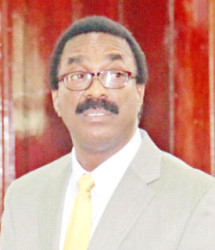Public servants, both past and present will be subjects of investigations conducted by the State Asset Recovery Unit (SARU), Attorney General Basil Williams said yesterday while hinting that there is no need now to investigate ministers of this government.
Williams made these comments ahead of public consultations on the draft State Assets Recovery Bill 2016. This forum is being held today at the Pegasus Hotel from 9 am.
“It is a timely bill and our government welcomes the bill. Of course public officials means past and present so it doesn’t mean that because you’ve left the office that you escape the reach of SARU,” he told reporters.

Told that Opposition Leader Bharrat Jagdeo had recently questioned whether the unit, which under this new legislation will be renamed the State Assets Recovery Agency (SARA) would be investigating current government ministers, Williams said that question was answered in his reference to past and present public officials. He then added, “Well I don’t know whether there is anybody to investigate after a year in office as against 23 years.”
Williams said the draft bill was published on the Ministry of Legal Affairs’ website two weeks ago; it has six parts and is designed to create the SARA which will be headed by a director.
Additionally, he said the legislation proposes to create, the Recovery of State Assets Fund and it has provisions to empower the director and staff including the designation by the Public Security Minister of such staff as police officers or immigration officers, designation by the Minister of Finance also of such staff as customs officers and revenue officers.
Williams said SARA is largely “a civil recovery and civil remedies bill.” He explained that there will be civil recourses and restraining orders, among other courses of action which will be undertaken by the agency, along with aspects of international cooperation which all relate to state assets, stolen or unlawfully acquired by public officials or any other person.
Those assets, he said, could be reached “wherever the trail takes the director and his staff.”
Today’s session, he said, will see representatives of the US Embassy, UN and World Bank and a UK specialist who assisted with the crafting of the bill.
He said that this bill is vital in the war against corruption by state officials, public officials and persons with whom they may have acted in concert. Williams told the media that members of the public are invited to attend and give their views.
He said just as was done with the Cyber Crime Bill 2016, there were a lot of proposals which were taken into consideration and worked on. The Cyber Crime Bill was laid in the House last week and has gone to a Special Select Committee.
“Not all bills will go to the Special Select Committee. Once we believe that the consultations are open, transparent and adequate then of course we will take the bill through its normal course,” he said. He added that bills which go to the Special Select Committee could take some time and be delayed.
He said that this draft bill was sent to the “usual stakeholders” and those who have an interest such as the Guyana Human Rights Association, the Bar Association and the Private Sector Commission.
Asked how much longer it would be before the bill reaches Parliament, Williams said the provisions are quite clear and “I don’t see any complexity in the bill. The bill is aimed at a particular mischief and… developed in consonance with the United Nations Convention against Corruption.
He said that so far SARU has been stymied in conducting investigations and that is why this bill is important. “During the course of their investigations they have found that when they request information from various agencies that information wasn’t forthcoming. This bill will allow them to receive such information,” he said.
Asked about the recoveries SARU would have been able to make up to this point, Williams was unable to say; he reminded that SARU has a director and is independent. He said that an important aspect of the bill is the creation of a fund where recovered assets would be placed.
It is expected that consultations will be done countrywide.





